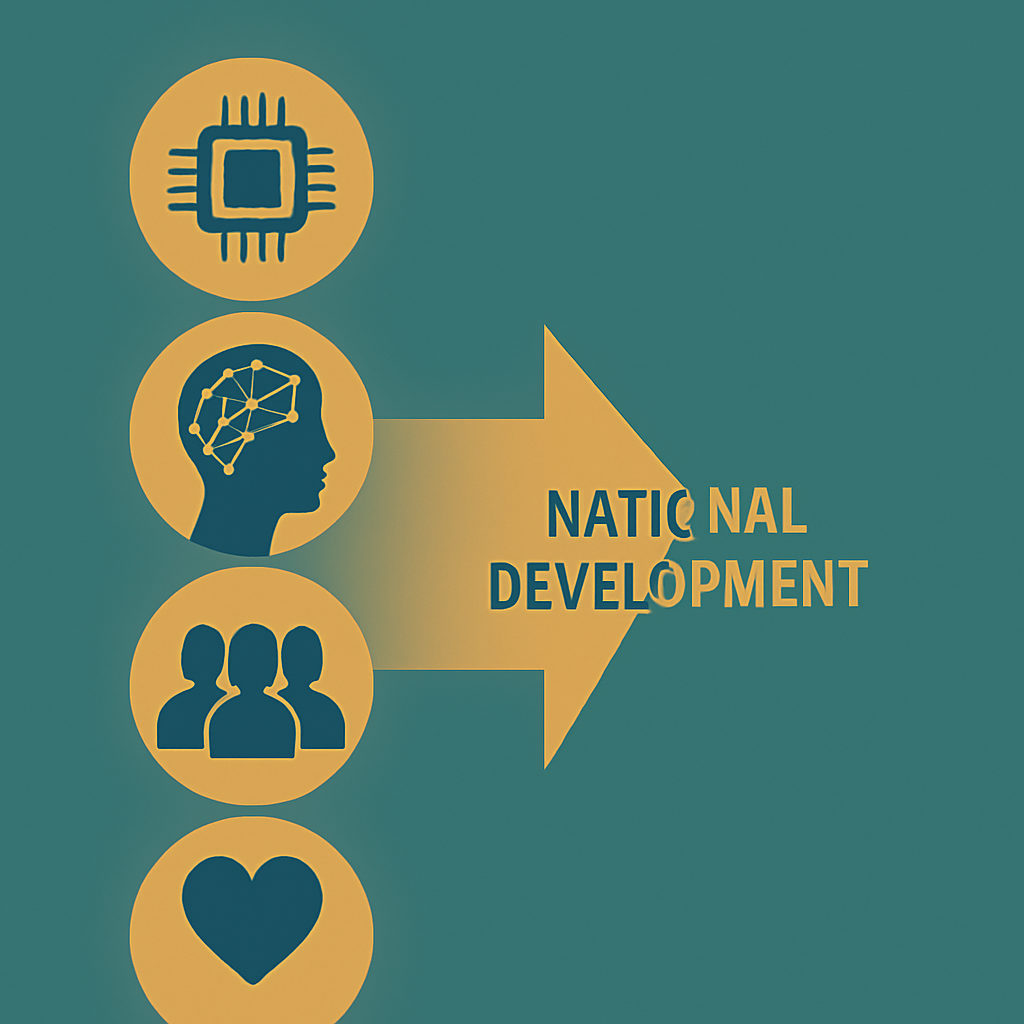|
Chapter 10: 4Capital and National
Development
 The concept of 4Capital—material,
intellectual, social, and spiritual—offers a clear, comprehensive
way to understand national
development. A country’s progress and well-being cannot be
captured by material wealth alone. Sustainable development requires
a balanced integration
of all four capitals. The concept of 4Capital—material,
intellectual, social, and spiritual—offers a clear, comprehensive
way to understand national
development. A country’s progress and well-being cannot be
captured by material wealth alone. Sustainable development requires
a balanced integration
of all four capitals.
Material Capital
Material capital includes financial resources, physical
infrastructure, and natural assets. Roads, energy systems, water,
housing, and digital connectivity form the foundations for safety,
mobility, and commerce. When maintained and stewarded well, these
assets support productivity and protect communities; when neglected,
they create bottlenecks and fragility.
Intellectual Capital
Intellectual capital comprises education, skills, research capacity,
technology, data, software, and protected intellectual property.
Nations with strong learning systems and innovation ecosystems adapt
better to change and compete more effectively. Talent development,
knowledge transfer, and responsible use of data and technology are
central.
Social Capital
Social capital refers to trust, norms of reciprocity, and networks
that enable cooperation among citizens and institutions. High social
capital improves governance, lowers the cost of coordination, and
strengthens resilience in crises. It includes both bonding ties
(reliability within groups) and bridging ties (connections across
groups and regions).
Spiritual Capital
Spiritual capital involves shared values, moral standards, and
purpose that guide behavior toward the common good. For people of
faith, it can be connectedness with God; for others, commitment to
noble purposes and ethics. When values shape institutions and civic
life, they support unity, integrity, and responsible leadership.
Integration for national
performance
Countries that
focus on one capital alone—such as money without trust, or
innovation without ethics—often face inequality, environmental
stress, or social conflict. Nations that cultivate
all four capitals together
tend to experience more
sustainable growth, higher
well-being, and
stronger resilience.
Material invests in capability; intellectual turns ideas into
progress; social enables cooperation and good governance; spiritual
keeps power and ingenuity directed at worthy goals.
Indicators and measurement
(concise)
Beyond GDP, national
performance benefits from
broader dashboards that include education and innovation
measures (intellectual), trust and participation (social), and
purpose- or ethics-based indicators (spiritual), alongside
infrastructure and resource stewardship (material). Dr. Alex Liu’s
Spiritual Capital Index
(SPI) provides an inclusive way to reflect purpose and
moral commitment across diverse beliefs. Together, these indicators
offer a more complete view of national development.
Policy implications
• Plan across capitals:
align infrastructure, education, civic institutions, and
values-based leadership.
•
Invest in complements:
pair physical projects with talent, community engagement, and
ethics-by-design.
•
Steward shared assets:
protect land, water, energy, cultural heritage, and institutional
trust.
•
Build resilience:
diversify critical inputs, maintain assets, and strengthen bridging
ties across regions and groups.
• Govern responsibly:
transparency, fairness, and rule of law reinforce social and
spiritual capital.
Conclusion
The 4Capital framework provides a practical lens for national
development. By recognizing the
interdependence
of material, intellectual, social, and spiritual capitals—and
cultivating them in balance—nations can pursue prosperity that is
innovative, resilient, and deeply humane.
4Capital => life
satisfaction of individuals
4Capital =>
organizational performance
4Capital => country
development
Note: The work
presented here includes research conducted by Dr. Alex Liu at
Stanford University and that for the Global Entrepreneurship
Monitoring initiative. Dr. Alex Liu greatly benefited from valuable
discussions with several accomplished authors, including Danah
Zohar, author of 'Spiritual Capital'; Ernie Chu, author of 'Soul
Currency'; Theodore Roosevelt Malloch, author of 'Spiritual
Enterprise'; and Lawrence M. Miller, author of 'The New Capitalism'.
Note:
To cite us, please write "Liu, Alex. 4Capital and
Performance, RM Publishing, 2008, ResearchMethods.org,
https://www.researchmethods.org/4capital.htm.
|